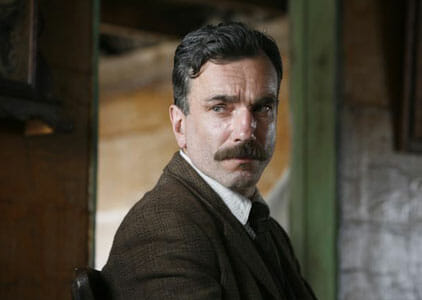The ?lm follows Daniel Plainview (Daniel Day-Lewis), a silver miner who, determined to claw his fortune out of the ground, winds up in the oil business. After one of Plainview’s coworkers is fatally impaled by an oil drill, Plainview adopts the man’s infant son H.W. (Dillon Freasier), launches his own drilling operation, and follows a tip to Little Boston, Calif., where he snatches up acres of priceless, oil-addled land from the devout—if naive—Sunday family, whose son, Eli (Little Miss Sunshine’s Paul Dano), is a preacher in an upstart evangelical church.
In the grand spirit of Citizen Kane, There Will Be Blood touches on broad American themes, and Plainview’s story (itself based loosely on real-life prospector-turned-millionaire Edward Doheny) feels oddly topical, given America’s reliance on petroleum (and the lengths we are willing to go to in order to procure it, both as individuals and as a nation). But, ultimately, There Will Be Blood is not a ?lm about oil or prospecting or the allure of endless cash: the movie focuses—sometimes distractingly—on one man’s epic ascent and crumble. Lewis is unrecognizable in an Oscar-fated turn that feels, at times, dangerously private—the actor has internalized Plainview so thoroughly that Plainview’s motivations are never entirely evident, and despite Day-Lewis’ considerable screentime (he’s front-and-center for nearly every one of the movie’s 158 minutes), he manages to keep Plainview surprising.
Dano is almost as captivating as Eli Sunday, a young, vaguely menacing preacher with a penchant for theatrics. Sunday and Plainview (note the aw-shucks, unassuming American names) are charlatans of equal caliber, and Anderson is quick to point out that businessmen and clergymen can—and do—occasionally draw from the same sack of tricks: Plainview uses his sweet-faced son to coerce landowners into forking over their oil-rich plots, while Sunday exploits the faith of his congregation, hypnotizing them with stagecraft and carefully timed squeals of rapture. Dano and Day-Lewis are spectacular onscreen rivals, constantly absorbing each others’ punishment and returning it threefold, re-emphasizing a connection to which both seem oddly oblivious. Lewis’ gnarled puss compliments and contrasts Dano’s moonish face, and the moments in which their actions are most directly mirrored (Plainview is forced to declare, “I abandoned my son”; Sunday is bullied into hollering, “I am a fake prophet, God is a superstition”) are genuinely profound.
Shot in Marfa, West Texas, a town best known for mysterious nocturnal lights (according to local reports, hovering globes of colored light have been appearing just south of U.S. Route 90 for the better part of a century), There Will Be Blood employs nature as both friend and foe—it’s the same landscape Joel and Ethan Coen captured in No Country for Old Men, and it feels just as threatening, just as precarious and just as humbling. Anderson has shifted from the stunt shots and criss-crossing narratives that peppered his earlier ?lms, now letting his actors and location do the bulk of the subtextual work while Radiohead guitarist Jonny Greenwood’s prickly, inventive score—which, aside from Lewis’ performance, is the most striking component of the ?lm—blares in and out like a siren, anxious and disorienting. Greenwood has been working as a solo composer for several years (in 2003, he scored Bodysong, Simon Pummell’s documentary about the human life cycle), and his violent, occasionally atonal string bursts slice through the story like a jagged, bloody shiv.
Still, the most interesting thing about There Will Be Blood may be how it succeeds in spite of its profound and unforgivable ?aws: The ?lm ?its from riveting to tedious, sometimes broaching both within a single scene. The narrative is slow and, at times, overwrought; there is no central con?ict, no climax, no proper denouement. Women are barely present; subplots pop up and disappear without consequence. Audiences are likely to stumble out of the theater feeling tired, unsettled and tense. But There Will Be Blood is still an incredibly signi?cant ?lm—the most signi?cant of Anderson’s career—and it manages to say an awful lot about American character, then and now.
